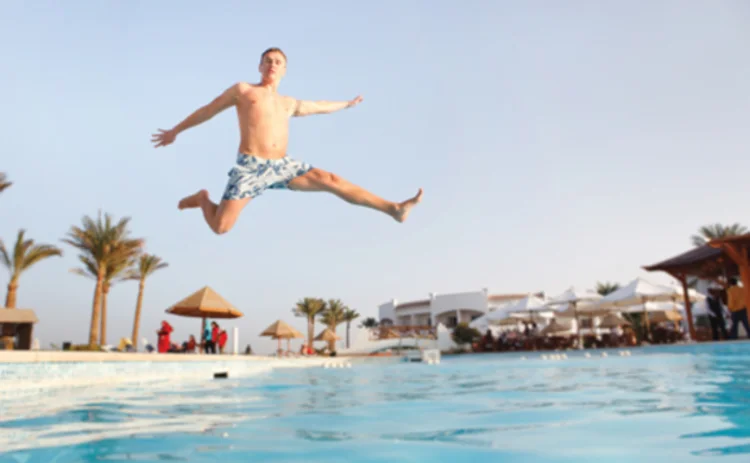
Holidaymaker injuries: Making a splash

The popularity in unusual and dangerous crazes performed by holidaymakers has serious implications for the insurance industry.
Holiday high jinks or just stupid behaviour? Whichever way you look at it, the bill to treat injury due to dangerous activities such as ‘balcony jumping’ should not be picked up by travel insurers. The number of people killed or seriously injured in preventable accidents abroad is rising. Axa has already seen as many claims this summer for holidaymakers injuring themselves by falling off balconies and other surfaces as it did for all of 2010.
Rise in crazes
Many of these incidents are related to the rise in crazes such as balcony jumping, owling, planking and batmaning in unusual locations and posting photographs on social media websites. Rather predictably perhaps, these statistics also show that the majority of injuries and incidents potentially related to these crazes occur among young adults. Policyholders, or even their parents, may find themselves with large medical and repatriation bills if the insured has needlessly exposed themselves to danger.
It’s hard to say why these accidents are increasing, but there seems to be a mentality that says it is okay to behave abroad in ways people never would when at home. With balcony jumping, for example, accidents are extremely rare in the UK and typically involve either a suicide bid or failure of a balcony structure. Abroad however, it can be difficult to pin-point the cause of an accident, as it will not be logged by the hospital or the police as ‘injury due to owling’. Unless there are witnesses willing to testify, insurers will be required to investigate, which could take time and may cost up to £5000. Often with these claims insurers are caught in a vicious circle. Axa currently has a claim for £30 000 for a fall in a well-known European resort where there were no witnesses. The injuries and location of the person are consistent with a balcony fall, but until the circumstances are fully understood, we cannot pay the claim.
Drinking dimension
The spend on claims relating to these incidents can be huge, especially if they involve repatriation by air ambulance from outside of Europe. Repatriation alone can cost
£30 000 from Europe, and up to £60 000 from the US. Treatment and rehabilitation costs are often very high too. A daily hospital rate before treatment can run to £5000 in Europe and
$15 000 (£9500) in
the US.
These incidents often coincide with heavy drinking, which negates any travel insurance claim. However, many foreign travel clinics are unwilling to carry out toxicology tests because they know their bills won’t be paid if a policyholder is found to be intoxicated. Even if a report is carried out, it can go missing when insurers began to investigate. In many instances, the burden of proof for intoxication will be on the insurer.
Axa has witnessed an increasing number of accidents due to these crazes, but we don’t know how widespread the problem is, or if other insurers are seeing a similar increase? The Association of British Insurers must open communication with the industry to identify the extent of the problem. Currently, ABI statistics fail to give an indication of the causes of medical claims, so there is no accurate measure. The data available shows that, in 2010, the industry dealt with 337 000 claims for overseas emergency medical treatment — almost 6500 cases a week — and that this number has risen threefold over the past six years.
There is a lack of visibility when investigating these claims because they are only reported to us as injuries resulting from an accident. Insurers are forced to rely on experience to piece together evidence if we suspect that the accident was a result of reckless behaviour. The industry has every sympathy with the injured and their families but cannot simply pay out because somebody makes a claim. However, if insurers fail to pay out or payment is delayed due to an investigation they often get cast as the bad guy by the media.
It is not the goal of the industry to stop holidaymakers having fun, but we do feel that it’s necessary to change the behaviour of this group of young travellers who take unnecessary risks with their lives. There needs to be an industry-wide education programme warning of the risks of behaving irresponsibly while on holiday. We have already engaged with the ABI on this issue but what’s really needed is wider public education highlighting the dangers. There is a clear difference between harmless fun, carried out somewhere safe, and taking a major risk. Of course, insurers might be branded kill-joys but when the alternative is accident or even death it’s worth taking the criticism on the chin.
Axa would welcome a debate within the industry to find ways of reducing these accidents. Tighter policy wording, for example, could help and most insurers are able to make changes to sales processes to ensure customers understand, from the outset, that putting themselves in unnecessary peril will not be covered.
Possible solutions
While we have sympathy with the clinics who don’t want to be out of pocket due to a holidaymaker’s over-exuberance, it would help if they thought about possible solutions like,
for example, making toxicology testing a standard procedure for such incidents. Travel insurance is there to protect against accidents, but it’s not a catch all and holidaymakers have a duty to act responsibly and take all reasonable precautions to avoid injury. As an industry we have a duty to make the message clear that we won’t pay for a
policyholder’s mistakes.
|
The thrill seekers glossary |
||||||
|
Balcony jumping: a deadly craze of leaping from hotel balconies into swimming pools, with vodep clips often posted on Youtube |
||||||
|
Owling: The thrill-seeker crouches on haunches in an owl-like fashion, with style marks awarded for posing in unusual situations. Photographs are then posted on social networking sites |
||||||
|
Planking: Also known as 'the lying down game', participants lay face down with their armsby their sides in strange and often dangerous locations, with photographs taken and posted on social networking sites |
||||||
|
Batmanning: The latest fad is similar to planking, but with the subject suspended from their ankles. As with balcony jumping, owling and planking, social media is a crucial element |
||||||
|
The dangers of the game |
||||||
| While many have considered planking and balcony jumping harmless fun, the consequences of the game can prove fatal. In May 2011, Acton Beale, a 20-year-old man, plunged to his death after reportedly planking on a seventh-floor balcony in Brisbane, Australia. Ryan Elley, 20 from Portsmouth, was seriously injured, suffering bleeding on the brain, after falling from a second-floor balcony in Playa d’en Bossa. He was reportedly balcony jumping. Twenty-year-old Australian Simon Hallam was also seriously injured in May 2011 when he attempted to ‘plank’ on his friend’s moving car. Doctors had to put Hallam in an induced coma to save his life. |
||||||
Only users who have a paid subscription or are part of a corporate subscription are able to print or copy content.
To access these options, along with all other subscription benefits, please contact info@postonline.co.uk or view our subscription options here: http://subscriptions.postonline.co.uk/subscribe
You are currently unable to print this content. Please contact info@postonline.co.uk to find out more.
You are currently unable to copy this content. Please contact info@postonline.co.uk to find out more.
Copyright Infopro Digital Limited. All rights reserved.
You may share this content using our article tools. Printing this content is for the sole use of the Authorised User (named subscriber), as outlined in our terms and conditions - https://www.infopro-insight.com/terms-conditions/insight-subscriptions/
If you would like to purchase additional rights please email info@postonline.co.uk
Copyright Infopro Digital Limited. All rights reserved.
You may share this content using our article tools. Copying this content is for the sole use of the Authorised User (named subscriber), as outlined in our terms and conditions - https://www.infopro-insight.com/terms-conditions/insight-subscriptions/
If you would like to purchase additional rights please email info@postonline.co.uk
Most read
- RSA ‘pragmatic’ on product review as NIG acquisition completes
- Direct Line Group confirms Milliner amid raft of leadership hires
- Wakam looking to exploit ‘unlimited UK potential’ following regulator approval







